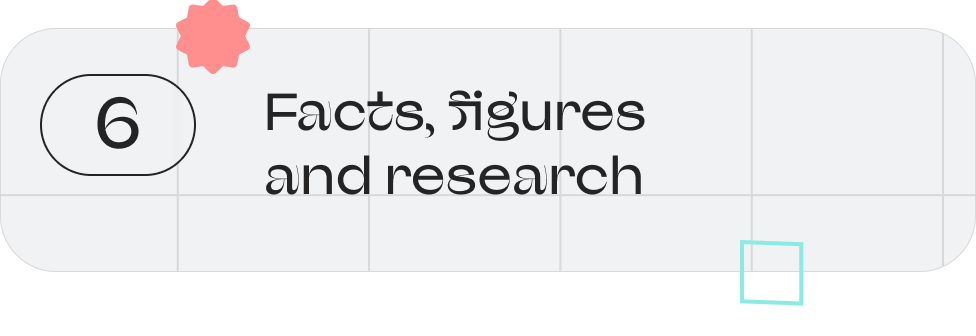
Are you struggling to understand the difference between disinformation and misinformation? No idea what an incel is or where QAnon comes from? The Dangerous Dictionary is here to help you.
Words matter! Especially when you are debunking or countering conspiracy theories online. There are a range of approaches you can use if you want to do something about the dangerous things you’ll find in this dictionary.
The easiest way to get rid of toxic content is to get platforms or users to remove their comments. If comments are illegal, or if they go against the rules of the social media platform, you could report it to either law enforcement or to the social media platform you found it on. But, since we are talking to real life people here, you can also start a conversation and ask the user directly in a private message.
While the message is still online we can use different approaches to reduce the impact of the content. One approach is to debunk, fact-check, or use counter & alternative narratives and steer the conversation in a different direction. Most people online will only look at content and not engage in a conversation, so it is important to make sure that a different perspective is also available. If we leave conspiracies unchecked online, new audiences will be easier manipulated. So act in the comment sections! Start a polite conversation and steer people in the right direction of factual information, people who share conspiracy theories might not have access to the right information. Remember that it is okay to be sceptical of certain things, but it gets problematic when people start to believe someone else’s lies.
A conspiracy theorist may be your friend, family member, neighbour, or a colleague at work.
Although talking to them about their beliefs can be incredibly difficult and challenging, having these conversations is becoming increasingly important. Here’s a list of tips on how to have these conversations:
Show honest interest and begin by listening to the person, allowing them to describe the theories they believe in. Find out if there is a reason why they have turned to conspiracy theories, or if they are experiencing grievances in their life that have pushed them to have these beliefs. Listening to them first will also give you a more informed position on what they believe, so you are able to tailor your response.
Message individuals directly, or better yet, have a conversation in person. Don’t publicly shame someone for their views, especially on social media, as that will likely backfire.
By presenting yourself as open minded and happy to listen to the person, you can build a level of trust that is necessary to engage in such a difficult conversation. Try not to tell the person their views and opinions are wrong, rather find out what the context is in which they developed these opinions.
Conspiracy theories all start from somewhere, and are usually based on small elements of truth. Agreeing on this can help build trust.
Asking questions can help to provoke reflection and critical thinking from the person. Ensure that you ask questions without judgement, so as to plant seeds of reflection in their heads.
Come prepared, and present your research neutrally. Use independent fact-checking websites like Full Fact or PolitiFact. Keep in mind that the person may still refute anything you present them with, no matter how neutrally you do it.
Be realistic when talking to a conspiracy theorist, and if trying to make loved ones understand your perspective is impacting your mental health, it might be best to stop having these conversations for now. They could still change over a longer period of time however, so try not to cut off all contact with them and lose your relationship.

We’ve taken a selection of words surrounding the topic of conspiracy theories and defined them, even providing you with short explainer videos for some of them. And if there’s a word you come across whilst unravelling the conspiracy behind conspiracies that you don’t understand, feel free to ask us!

Algorithms
ˈal-gə-ˌri-t͟həmA process or set of rules to be followed in calculations or other problem-solving operations, especially by a computer. Used heavily in social media to decide what content to show.
Alternative Facts
ȯl-ˈtər-nə-tiv ˈfaktsFalsehoods, untruths or delusions. A fact is something that actually exists - what we would call “reality” or “truth.” An alternative is one of the choices in a set of given options; typically the options are opposites of each other. So to talk about alternative facts is to talk about the opposite of reality (which is delusion), or the opposite of truth (which is untruth).
Alternative-Narratives
ȯl-ˈtər-nə-tiv ˈner-ə-tivsA collection of stories built around positive and inclusive messages, which can be proactively shared. In times of disinformation, polarisation, and hate speech, they are powerful tools to help people speak up and look beyond the negativity.
Amplification
am-plə-fə-ˈkā-shənThe rapid and wide spread of information, as a result of algorithms, engagement, and the role of influencers/personas.
Anti-Vaxxers
ˌan-tē-ˈvak-sərPeople who are against vaccinations.
Biolabs
ˈbī-(ˌ)ō-ˌlabsBiochemical laboratories, often used for medical or chemical research.
Bots
ˈbätsA device or piece of software that can execute commands, reply to messages, share messages, or perform routine tasks, such as online searches, either automatically or with minimal human intervention.
Black-and-White Thinking
ˈblak ən(d) ˈ(h)wīt ˈthiŋ-kiŋA metaphor for ‘thinking in absolutes’, something that happens in a polarised debate or situation.
Confirmation Bias
ˌkän-fər-ˈmā-shən ˈbī-əsThe tendency of human beings to agree with information that matches their existing notions and beliefs.
Conspiracy Theory
kən-ˈspir-ə-sē ˈthē-ə-rēAn explanation for an important societal event claiming the involvement of a powerful group or a person that secretly plotted to set this event in motion.
Counter-Narratives
ˈkau̇n-tər ˈner-ə-tivsA collection of stories created to deconstruct, debunk or delegitimise false or dangerous information.
Deepfake
ˈdēp-ˌfākA combination of “deep learning” and “fake”, used to combine and superimpose existing images and videos onto source images or videos through artificial intelligence (AI).
Disinformation
(ˌ)dis-ˌin-fər-ˈmā-shənInformation shared to do harm, and to manipulate. These stories are often entirely made up or use deliberately manipulated content.
Echo Chambers
ˈe-(ˌ)kō ˈchām-bərsA (online) space in which we constantly hear our own thoughts and opinions being bounced back to us on repeat by different people, without any form of thought-provoking criticism.
Fake News
ˈfāk ˈnüzFalse information that’s created purely for financial gain or political destabilisation. This term is not used so often anymore as it is too simplistic. Instead, refer to disinformation.
Filter Bubble
ˈfil-tər ˈbə-bəlEcho chambers - but with algorithms.
Flat-Earthers
ˈflat ˈərthərsA group of people who believe in the conspiracy theory that the world is flat.
Framing
ˈfrā-miŋRefers to the act of constructing something from a specific point of view, mostly in the media. Depending on the source you are getting your news from, you might hear about the same events but from a different perspective.
The Great Reset Conspiracy Theory
t͟hə ˈgrāt (ˌ)rē-ˈsetA growing online conspiracy that claims a global elite is using COVID-19 to dismantle democracy and enforce radical social change.
Implicit Bias
im-ˈpli-sət ˈbī-əsBias that occurs automatically and unintentionally, but affects judgments, decisions, and behaviours.
Incel
ˈin-ˌsel Short for ‘involuntary celibate’. Men who are part of an online subculture. They tend to be self-hating, misogynistic, and racist, and define themselves as unable to find a romantic partner, despite their desire for one.
Malinformation
ˌməl-ˌin-fər-ˈmā-shənFactual information shared to do harm. This can be done by exposing someone’s private information or pictures, or by using content out of context.
Misinformation
ˌmis-ˌin-fər-ˈmā-shənUnintentional false information. It can be a mistake by a journalist, or someone who shares gossip. It can still be harmful, but there is no intent to do harm.
Narratives
ˈner-ə-tivsTelling stories or representing a situation in such a way that it reflects or conforms to an overarching set of values. People often frame stories and events differently in order to fit into their particular narrative.
Online Hate
ˈȯn-ˈlīn ˈhātAny kind of speech that’s used to alienate somebody or to actively cause someone violence.
Polarisation
ˌpō-lə-rə-ˈzā-shənA process of increasing ‘us-versus-them’ divisions in society. Check out our guide ‘Beyond Polarisation’ to find out more.
QAnon
ˈkyü-a-nənAn American political conspiracy theory, originating on the websites 4chan and 8chan; which has recently taken hold in Europe. While the theory now encompasses many different ideas and characters, the core of the theory involves a belief in a cabal of elites operating a global child sex trafficking ring.
Selective Exposure
sə-ˈlek-tiv ik-ˈspō-zhərAvoiding content that is of a different perspective or challenges one's own position, often only focusing on media that aligns with one’s views.
Tribal Mentality
ˈtrī-bəl men-ˈta-lə-tēA human instinct to belong to a group, but also to exclude other groups.
Verification
ˌver-ə-fə-ˈkā-shənThe process of checking and proving that something is correct or true. In journalism, articles are generally fact-checked and verified before they go out to the public.
Whataboutism
ˌ(h)wä-tə-ˈbau̇-ˌti-zəmA logical fallacy, which attempts to discredit an opponent that is committed to another position, by changing the subject’s focus and claiming that an offence carried out by someone else is similar or worse. Want to know more about logical fallacies? Go to https://yourlogicalfallacyis.com/.















